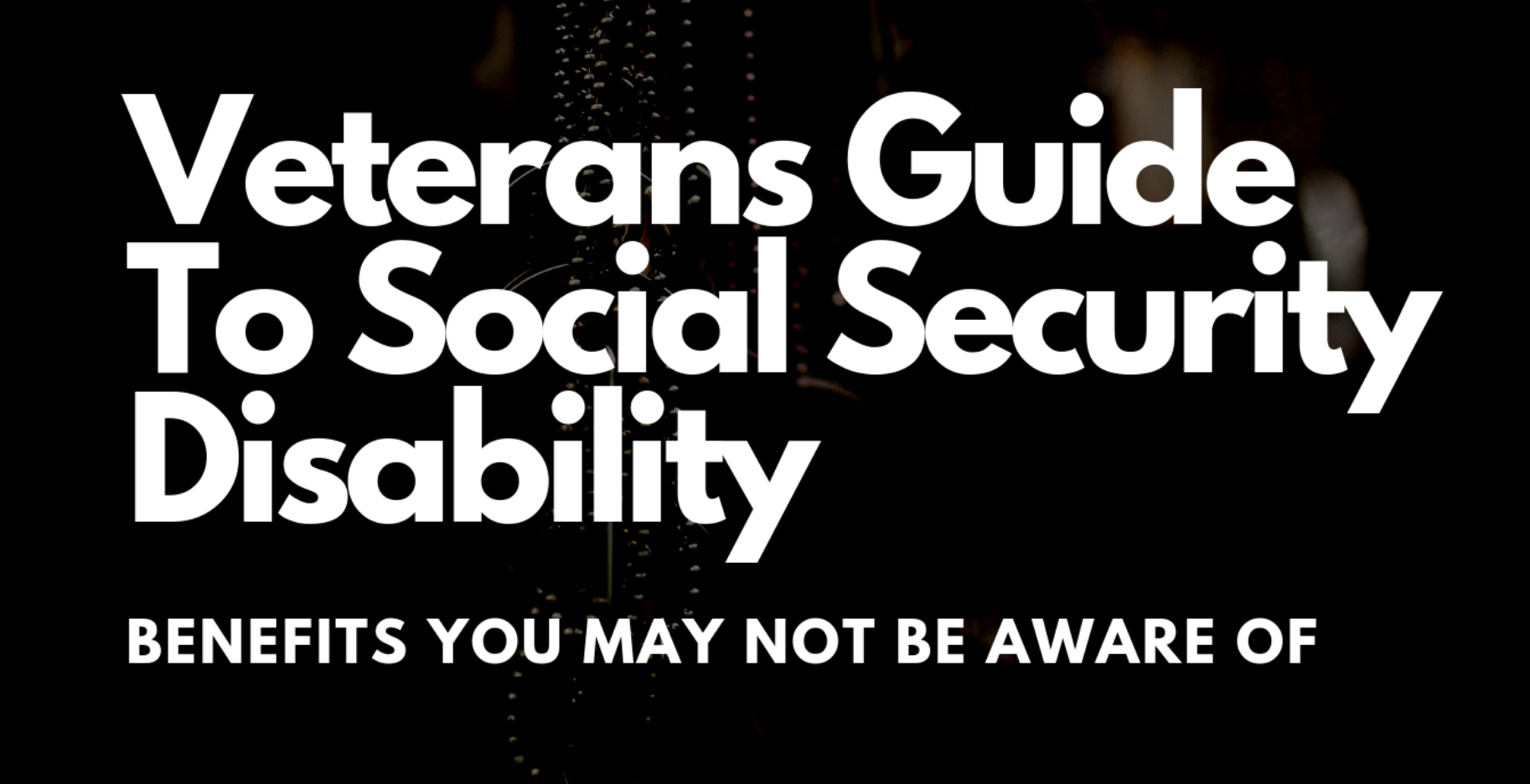
16 Aug Download Our eBook Or Take Our Free Evaluation To Qualify Veterans Benefits
*Advertisement*
The SSA and VA systems of disability benefits are separate and quite different.
Disabled veterans are able to collect Social Security disability benefits and veterans disability benefits at the same time, so disabled vets will usually find themselves dealing with the Social Security Administration (SSA) at one point or another. This can be extremely hard to navigate on your own. Many veterans end up turning to a Lawyer to assist them in recovering the benefits that they are entitled to.
In this book, we’ll explain the key aspects of the Social Security system as well as the definitive differences that exist between the two systems.
How Does Social Security Disability Work?
A person can apply for disability benefits at a Social Security office or online. The applicant will receive an initial decision within three to four months. (Veterans with service-connected disabilities may have their cases expedited through Social Security’s “Wounded Warrior” program.
The applicants’ file is then assigned to a disability examiner. This person is a specialist who will gather the claimant’s medical records and, then, in consultation with a physician and/or a psychologist who is assigned to the examiner’s unit, make an approved or denied decision. Unfortunately, the decision that is most commonly made is a denial. If the claim is approved, the claimant is considered 100% disabled, and will be paid either SSDI benefits based on their previous wages or SSI benefits based on the amount of income they have (only those who have low income and low assets qualify for SSI).
If the claimant is denied, they may follow the disability appeal process and get a reconsideration review. Usually, after a long wait, the claimant can get a hearing with an administrative law judge (ALJ). It can take a VERY long time to have a hearing date set. Depending on which part of the country the applicant resides in, and how back-logged the local hearing office is, it may take a year or longer to have a hearing date set. Asking Social Security to expedite your case for a service-connected disability may help speed up the process.
Take Our Free Evaluation To See If You Qualify For $2,700 Per Month
Differences Between Social Security and Veterans Disability
One example of a major difference between Social Security disability and Veterans disability is that you do not need to be completely disabled in order to receive VA compensation. In reality, most veterans who receive VA compensation do not receive a total disability rating. Veterans can receive a compensable rating as low as 10%, and can even have a rating as low as 0%.
If it escalates into a more serious issue, it can turn into a compensable disability. Social Security disability does not compensate disability claimants based on a partial loss of employability. You are either totally disabled or not disabled under Social Security’s definition of disability.
In the past, another difference between the two programs was due to Social Security’s “treating physician rule.” Until March 27, 2017, a “treating physician’s” medical opinion was given a great deal of weight. In VA law, the treating doctor’s opinion is not given differential weight, because of the important VA rule that decisions be based on the entire claimant file, so as not to give any particular evidence extra weight. After March 27, 2017, neither program measures the difference to the opinions of a treating physician.
Can I Receive both SSDI and Veterans Service Connected Benefits?
The short answer is Yes. Unless you are receiving a non-service related pension, there is no offset to receiving SSDI and VA Service Connected Benefits. AS long as you have served in the military or worked 5 out of the past 10 years, you are eligible to apply for Social Security Disability.
Medical Records and Social Security
If your primary source of treatment is a VA medical center, don’t assume that the Social Security disability examiner who is assigned to your case will be successful in obtaining your VA medical records. The VA is notorious in some areas for not supplying needed medical records to the Social Security Administration (SSA). Be prepared to fight for your records. This is one of the main reasons that it’s advised to contact an attorney when filing for benefits.
For this reason, it’s never a bad idea for vets to personally obtain their medical records themselves so they may turn these records in to the SSA when they apply for disability or file an appeal. One word of caution, though: never submit anything to Social Security without making a copy first, since the SSA is fairly notorious for losing things that have been submitted. Learn more about the medical evidence required by Social Security. You can also seek assistance from a law firm who can do this leg work for you.
The Role That Attorneys Play
In the Social Security system, an attorney works off a contingency-fee basis from the second they represent a claimant. In other words, if they win the case, they get paid up to 25% [Attorney Fees Are Capped at $] of whatever backpay that SSA decides it owes the claimant. The corollary of this, of course, is that the attorney receives nothing if the case is not won.
An award of VA disability benefits, also known as service-connected disability compensation, is not based on your income, so you can receive VA disability compensation and Social Security disability insurance (SSDI) at the same time. There is also a VA pension, which is a needs-based program similar to Supplemental Security Income (SSI).
VA pension is paid to veterans who have very little or no income and are disabled based on non-service disabilities. It is also possible to receive SSI and VA pension at the same time.
If you’re eligible, it’s best to qualify for VA disability compensation and Social Security disability insurance, since they generally pay more generous benefits than VA pension and SSI, but you should be aware of the other needs-based programs.
Can I work while applying for Social Security Disability?
If you are currently moving through the Social Security Disability process, you may earn up to $1180 per month in gross income and remain eligible for benefits. Should you exceed that amount, the Social Security Administration may flag your claim and determine that you have returned to work over the allowed amount, at which point qualifying for benefits becomes difficult. In many cases, it may be found that a “failed work attempt” was initiated if you returned to work earning more than the allowed amount for a few months but then once again dropped below the allowed earnings. Our Attorneys can provide more information on such situations.
Who is Victory Disability?
Victory Disability is a nationally recognized Social Security Disability firm who specializes in assisting Disabled Veterans to obtain the benefits they’ve earned. We have assisted hundreds of Veterans since 2014 and have received over $40,000,000 in retroactive pay and millions more in future benefits for Vets. Victory Disability maintains an “A+” rating through the Better Business Bureau, are sustaining members of the National Organization of Social Security Claimants Representatives (NOSSCR), National Association of Disability Representatives (NADR) and National Organization of Veterans’ Advocates (NOVA). Our Attorneys have been named Super Lawyer “Rising Stars” in 2019.
With 6 full time practicing Attorneys and over 35 support staff, Victory Disability is prepared to handle your claim and get the job done right.
Contact Victory Disability today at 1(866) 350-7229 for a FREE Case Evaluation.


